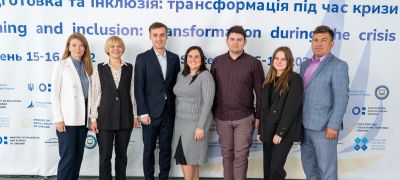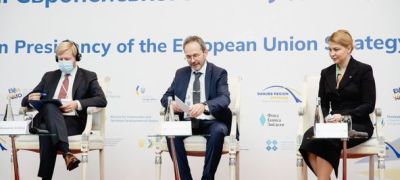Ukrainian Presidency of the Danube Region Strategy
- Home
- Directions
- Ukrainian Presidency of the Danube Region Strategy
Ukraine has become the first non-EU country to Preside over the EU Strategy for the Danube Region from November 2021 to November 2022.
Symbolically, we ended our Presidency as a candidate for EU membership.
The priorities planned at the beginning of our Presidency became even more urgent after the start of the russian full-scale invasion of Ukraine. And even despite the ongoing war, we continued to fulfill our obligations as the Presidency. As a result, the XI Annual EUSDR Forum was held under the slogan "Sustainable and Secure Danube Region" and aimed at strengthening cooperation of all 14 participating countries of the Strategy in countering the growing challenges and threats caused by the military aggression of the Russian Federation, the energy crisis and the COVID-19 pandemic.
During the presidency Ukraine focused on how to strengthen cooperation between the countries of the Danube region to get mutual benefit. The central priorities of Ukraine were:
- Sustainable development of the Danube Region: decarbonisation and transformation of the economy
- Development of human capital and labor markets
The Ukrainian Institute for International Politics, together with the Ministry of Communities and Territorial Development of Ukraine, with the support of the Hanns Seidel Foundation, has developed a logo and brand book for Ukrainian EUSDR Presidency.
The logo is a ship silhouette in blue and yellow colors. It symbolizes shipping and the Danube River channel.
The use of this logo and adherence to the rules set out in the brand book are critical to creating a positive image of Ukraine during its Presidency.
The brand book can be found via this link
Taking into account the priorities set by the EUStrategic Agenda for 2019-2024, the strategic objectives of the EUSDR, as well as the consequences of the COVID-19 pandemic caused by the spread of SARS-CoV-2 virus, which affected the lives of every citizen and country as a whole, Ukraine proposes to pay attention to the following topics during the course of its presidency in the EUSDR:
1. Sustainable Development of the Danube Region: Decarbonisation and Transformation of the Economy
The Danube region, like Europe as a whole, is not sufficiently prepared for the growing intensity, frequency, and prevalence of the climate change impacts, especially given the growing greenhouse gas emissions. That is why, adaptation to climate change has become an integral part of the European Green Deal and its external dimensions.
In the period of the environmental challenges the Danube region faces, the decarbonisation of the economy, which is close to security and further development of mankind issues, is of particular importance. A successful model of transition to carbon neutrality and introduction of the principles of circularity in production are essential for maintaining the planet suitable for human life.
Furthermore, decarbonisation of the economy can be accelerated by transition to low-carbon energy through the gradual abandonment of traditional energy sources, transition to renewable energy sources and introduction of innovative hydrogen technologies.
It is also worth being noted that one of the largest sources of pollution and greenhouse gas emissions today is the transport sector. 90-95% of pollutant emissions into the atmosphere caused by road transport.
Within this priority, Ukraine proposes to draw the particular attention to the following issues:
- development of hydrogen energy and transition to low-carbon economy;
- use of digital technologies, including the use of artificial intelligence to reduce greenhouse gas emissions;
- introduction of the principles of circularity in production, which provide for the reduction of the environmental, carbon and material footprint, by moving to environmentally friendly technological solutions;
- increase of the share of sustainable transport modes, such as rail and inland water transport;
- development of multimodal and intermodal cargo transportation;
- expansion of the TEN-T international transport network to neighbouring countries (non-EU countries) and development of cross-border infrastructure.
2. Development of human capital and labour markets
In recent years, there have been significant disparities in the development of the labour market and the employment rate in the Danube region. The gap between the countries with the highest and lowest employment rates is expanding every year.
This has become particularly evident in contrast to the global economic crisis resulting from the COVID-19 pandemic caused by the spread of SARS-CoV-2 virus. This requires joint action at both national and transnational levels in order to effectively address current challenges and future changes in the region as well as to ensure growth of the employment rate and welfare of the population of the Danube region by attracting additional investment in education, development of skills and adaptation of individual competencies to the qualification requirements of the labour market and the needs of the economy.
Within this priority, Ukraine proposes to focus on the following issues:
- ensuring the quality of education and its adaptation to the needs of the labour market
- increasing the level of digital and media literacy, knowledge of foreign languages
- introducing a lifelong learning strategy;
- including and integrating vulnerable populations and people with disabilities into the labour market;
- increasing the employment rate, especially among young people;
- improving the labour market and supporting social innovation.
1. Harmonization of EUSDR priorities, implementation, and evaluation
Embedding the EUSDR objectives in the main EU operational programmes, national and regional programme documents is crucial for the implementation of the EUSDR new Action Plan. Given that the process of harmonization of the EUSDR priorities, which currently remains at the subsequent stage over the course of Slovak Presidency, will require further comprehensive coordination in 2022. Ukraine identifies it as one of the political priorities of its presidency to ensure policy coherence within the EUSDR as well as to achieve certain goals.
Harmonizing the priorities of all macro-regional strategies with the EU programmes for 2021-2027 will help to address territorial issues more strategically through coordinated actions and synergy of efforts, which in turn will increase the efficiency of using EU funds and deepen dialogue between participants to this process.
This will allow achieving tangible results and will contribute to the growth of economic, social, and territorial cohesion in the Danube region in the long run.
In order to reflect the results and processes within the framework of the EUSDR as well as to carry out their analysis, it is expected to conduct policy/impact evaluation of the EUSDR.
Special attention during the Ukrainian presidency will be paid to the process of implementing a new monitoring system within the EUSDR.
2. Enhancing the institutional capacity of the EUSDR
The effectiveness of implementation of the priorities and achievement of the EUSDR objectives directly depends on the effective involvement of all participants in management and coordination of the EUSDR, in its implementation and effective work at the operational level.
Encouraging the participation of key stakeholders, including the National Coordinators and members of the Steering Groups of the EUSDR participating countries, and increasing the level of their communication support will facilitate the effective implementation of the EUSDR objectives and improve cross-sectoral cooperation within the framework of each priority area.
Given that the EUSDR establishes a framework for cooperation between EU member states and non-EU countries, it can also be considered as a powerful tool to strengthen integration processes and enhance cooperation with non-EU countries.
3. Strengthening the role of civil society in the implementation of the EUSDR
An advanced civil society is an integral part of all democracies across the globe.
The state of civil society development is an indicator of social and civic activity, motion and needs of the basic unit of democratic society, namely a citizen. Thus, civil society plays the role of an institutional link between the state and the citizen, in which public organizations execute the main functions.
Strengthening the role of civil society in the development of the Danube region and enhancing interaction with all stakeholders are crucial factors for further joint development and promotion of the EUSDR.
In this context, it is also important to focus on matters of more active involvement of young people and youth organizations in the EUSDR.
Enhanced cooperation with young people, their involvement in the formation and implementation of development policies will contribute to deepen cooperation between generations, to establish liaisons with local state administrations as well as to ensure experience sharing. All of these will lead, in the medium term, to the increasing competitiveness of the Danube region.
Highlights

Contact us
-
+380 50 424 85 24








